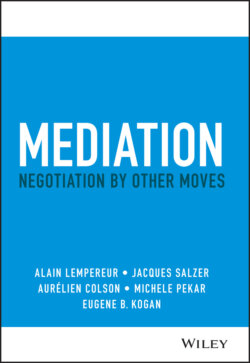Читать книгу Mediation - Alain Lempereur - Страница 39
The Desire to Impose, Avenge, or Punish
ОглавлениеOften, when suffering has been extreme in a conflict, the victim wants to make a case, to impose a sanction, to avenge, or to punish. Research has shown that in these situations, though mediation may not have been initially wished for by the parties, after having gone through it, the mediation process was actually able to satisfy them beyond what they envisioned.
Impose – When one party considers themselves to be right, they may want to get a sanction imposed, without paying attention to the desires and justifications of the other party. As mediation necessitates a minimum amount of listening and comprehension, it does not respond well to a pure demand of imposition. However, experience underscores that parties in this state of mind, when they are involved in mediation (for example, at a judge's request or in application of a contractual clause of compulsory mediation), can evolve if they find in the other party a recognition of the legitimacy of their claim for compensation.
Avenge – The culture of “an eye for an eye, a tooth for a tooth” refers to a logic of retaliation, which mediation stays away from. However, seeking vengeance implicitly expresses a demand for justice that mediation can help to recognize and reformulate. Mediation can be appropriate as a place where a lucid diagnostic of a situation emerges, including the suffering inflicted and felt, and consequently where the terms of a proportionate and legitimate compensation for the damage committed are discussed.
Punish – This demand differs from the logic of retaliation, as it does not aim to make the other suffer what we suffered, but to sanction through legal proceedings. This punishment is deemed to compensate for the misdeed – retributive justice – and to prevent its future recurrence – deterrence justice. It requires the intervention of an authority – hierarchical, judicial – whose role is to deliver a penalty – judicial sentence. Even when a willingness to punish exists, criminal mediation is used, notably for minor offenses (Lempereur 1999c). It provides an avenue of action for cases that would be otherwise dismissed. For example, it increases the chances that the “small” delinquents will understand their impact on the victims and acknowledge their wrongdoing through an apology. It also empowers the complainant, who can shape the compensatory measures.
